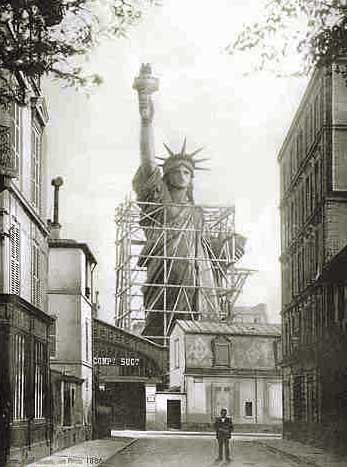Statue
of Liberty History
The Statue of Liberty history is not a simple tale
as one might learn in grade school about a grand gift from the French
as a gesture of friendship. The Statue of Liberty history involves
a more complicated tale particularly on the financial end, since
by many reports this gesture almost did not materialize at all.
The history of the Statue of Liberty begins with discussion between
France and the United States in regard to the gift from the French
to the Americans to celebrate America's centennial in 1876.
The French Third Republic was a shaky government at best at this
time but there was enough enthusiasm for this colossal gift for
a fellow republic that the project did keep moving forward.
Looking deeper into the history of the Statue of Liberty indicates
that sculptor Frederic Auguste Bartholdi and engineer Alexandre
Gustave Eiffel (who designed the Eiffel Tower) were the ones responsible
for bringing Lady Liberty to fruition. In an agreement between France
and the United States, the French would build the statue and the
Americans would build the base.
In France, money for the Statue of Liberty was raised by charitable
donations, performances of plays and operas and from a charitable
lottery. In the U. S., theatre plays, art auctions and prize fights
were held to raise money for the base.
The sculptor had wanted to complete the liberty statue by July
4, 1876 and present it at this time for America's centennial, but
because of technical and financial delays only the arm with torch
was completed at this time and on display in Philadelphia at the
Centennial Exposition. Visitors could pay 50-cents each to climb
to the torch balcony and this money was used to fund the building
of the pedestal.
History has it that the face of Lady Liberty was completed on June
30, 1878 and was displayed at the Paris Exposition. The real identity
of Lady Liberty's face has been the subject of debate and experts
believe she was modeled after either Isabella Eugenie Boyer or Bartholdi's
mother.
In 1882, France was able to complete the financing for the Statue
of Liberty. Back in the U. S., however, money was still being
sought to build the base. Publisher Joseph Pulitzer who would
later establish the Pulitzer Prize, used his newspaper, The World
to do fundraising for the pedestal.
 |
In July of 1884, the Statue of Liberty
was completed in France. In August of 1884 in the U. S.
construction of the pedestal stopped because of lack of
funds. In the Spring of 1885, Pulitzer resumed fundraising
through his newspaper and construction resumed in May.
|
In June 1885, the Statue of Liberty arrived in New York City
by boat from France. The statue arrived in 350 separate pieces.
In August 1885, U. S. financing for the base of the Statue of
Liberty was completed. Construction on the pedestal was finished
in April 1886.
The Statue of Liberty was finally uncrated as it was awaiting the
pedestal to be completed and was assembled in four-months and completed
on October 28, 1886. On this date, the Statue of Liberty was dedicated
by President Grover Cleveland, who had earlier obstructed the building
of the base.
For the first 16 years of its existence, the Statue of Liberty
was a beacon of light for immigrants coming to America, since it
was also a fully functioning lighthouse at this time. The statue
had a lighthouse keeper and an electric light that could be seen
for 24 miles.
So, you see, the Statue of Liberty history is a more complex one
than you may have been taught in school. According to the history
of the Statue of Liberty it took many people in both France and
the U. S. and many different efforts to bring Lady Liberty to life
and to the shores off New York City.
|

